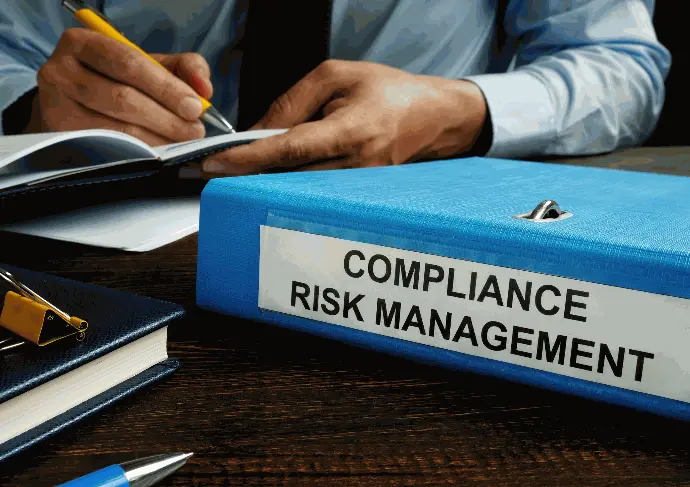Rethink Risk Management
and Shape a
Secure Future
Maintaining robust security and adhering to compliance standards have become increasingly complex. It is crucial to have effective data protection, strict regulatory compliance, and advanced risk management to safeguard sensitive information. Discover practical approaches to enhancing your organization's resilience and maintaining a competitive edge in a regulated environment.
Learn what Unified Portal
can do for your business
Regulatory Compliance Monitoring
Continuous Compliance Monitoring
Automated compliance tools help ensure that your organization remains in line with evolving regulations such as GDPR, MiFID II, and the eIDAS Regulation. These tools continuously scan for compliance issues, provide real-time updates, and automate the necessary adjustments to maintain adherence to legal requirements.
Audit Trail Management
Maintaining comprehensive logs of all system interactions and document access supports transparency and accountability. Detailed audit trails are essential for regulatory audits and reviews, facilitating easy tracking of data handling processes and ensuring that your organization meets compliance requirements, including those set by GDPR.
HIPAA Compliance
For healthcare-related data, ensuring adherence to HIPAA and the EU’s Health Data Protection Regulations is crucial. This involves protecting patient information through secure storage and restricted access. Implementing practices to ensure privacy and data security in compliance with stringent healthcare regulations.

Data Protection
and Encryption
KYC/AMLD Compliance
Adhering to the EU's Anti-Money Laundering Directive (AMLD) and Know Your Customer (KYC) regulations is crucial for preventing financial crimes. This involves implementing rigorous checks to verify customer identities and monitor transactions for suspicious activities. Such measures are designed to protect your business from illegal activities and ensure regulatory compliance.
Fraud Detection and Prevention
Utilizing advanced AI and machine learning helps in identifying and mitigating fraudulent activities in real time. These technologies analyze transaction patterns and behavior to detect anomalies that could indicate fraud, thus safeguarding financial assets and maintaining regulatory compliance with standards for data protection.
Robust Encryption
Applying industry-leading encryption methods to protect data both during transmission and while stored ensures that sensitive information remains secure. This aligns with GDPR and the Network and Information Security (NIS) Directive, which require robust data protection measures to prevent unauthorized access and breaches.

Access Control and Authentication
Role-Based Access Controls
Implementing role-based access controls restricts data access based on user roles within the organization. This ensures that only authorized personnel can access sensitive information, aligning with GDPR’s requirements for data access management and minimizing the risk of unauthorized data exposure.
Multi-Factor Authentication (MFA)
Adding an extra layer of security through MFA requires users to provide multiple forms of verification before gaining access. This practice strengthens data protection by ensuring that only authorized users can access critical systems, meeting ISO/IEC 27001 standards for enhanced security.
Automated Security Alerts
Real-time alert systems notify administrators of suspicious activities or potential breaches, allowing for immediate action to protect data. These alerts are crucial for maintaining compliance with GDPR’s breach notification requirements and ensuring rapid response to security threats.

Ready to build your
Unified Portal?
Environmental and Sustainability Compliance
Automated Compliance Tracking
Automated systems track compliance with environmental regulations, such as waste management and energy consumption directives. These tools help organizations adhere to EU environmental regulations, ensuring that sustainability practices are continuously monitored and reported.
In-Depth Sustainability Reporting
Comprehensive reporting tools offer detailed analysis and documentation of environmental impacts, such as energy usage and carbon footprint. These tools not only ensure compliance with EU regulations but also provide actionable insights for ongoing improvement, enabling organizations to maintain transparency and accountability in their sustainability practices.
Certification Management
Efficiently handle the processes involved in obtaining and maintaining various certifications, such as ISO/IEC standards or industry-specific compliance marks like BREEAM or LEED. The tools facilitate the entire certification journey—from initial application to periodic renewals—ensuring adherence to rigorous standards and supporting organizational goals for compliance and excellence.

Disaster Recovery
& Risk Management
Disaster Recovery Planning
Automated backup and recovery solutions prepare organizations for unexpected disruptions, ensuring business continuity. Effective disaster recovery planning aligns with GDPR requirements for data protection and helps in quickly restoring operations in case of data loss or system failures.
Data Encryption Protocols
Employing advanced encryption techniques to protect data ensures compliance with GDPR and the NIS Directive. Encryption safeguards sensitive business information from unauthorized access and cyber threats, maintaining data integrity and security.
Automated Compliance Reporting
Tools for generating compliance reports automatically help in demonstrating adherence to industry regulations and avoiding penalties. This feature supports ongoing compliance with various regulations, enhancing stakeholder trust and regulatory adherence.
